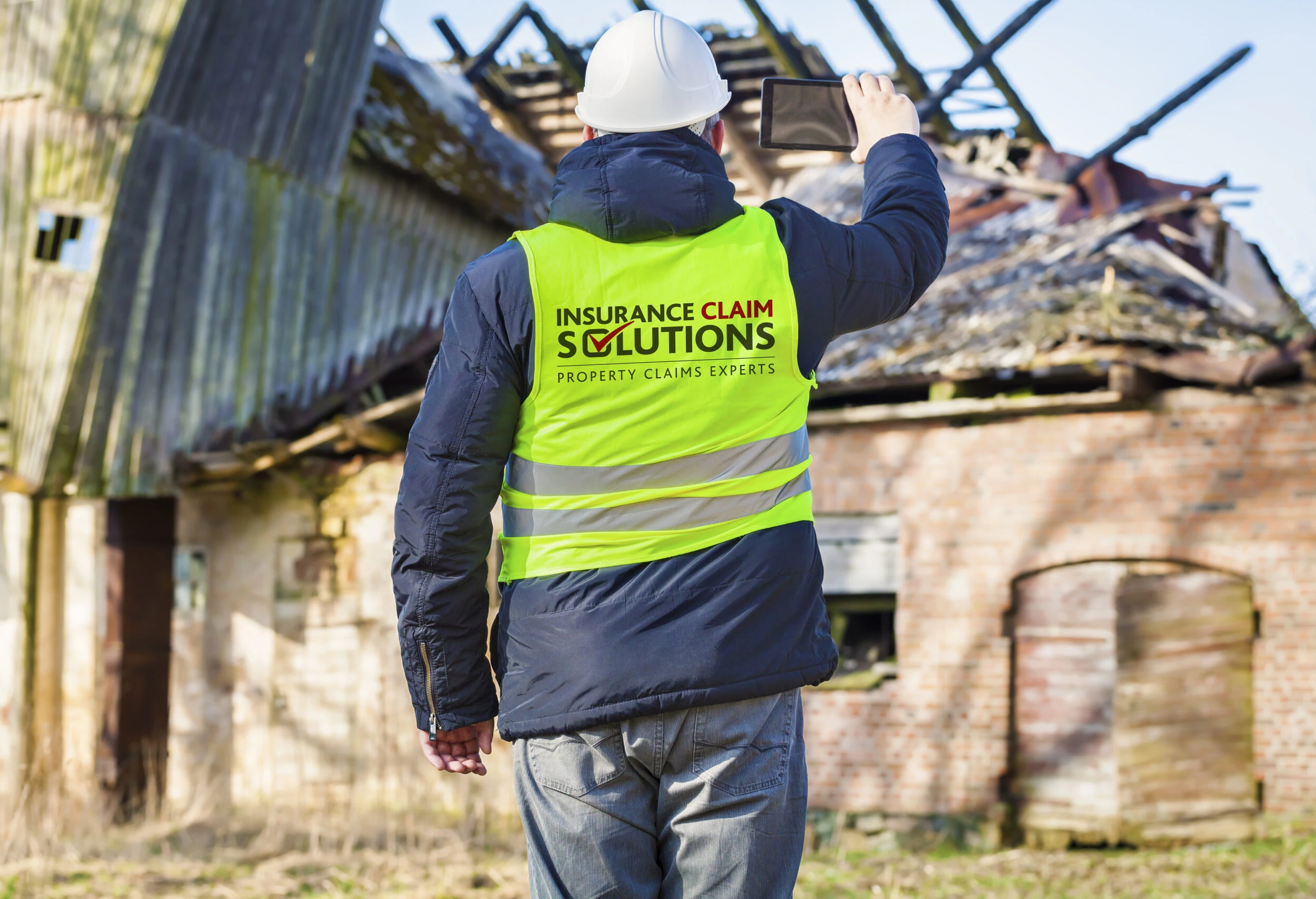Expert Insights for Irish Businesses
Authored by Trevor Kelly, Managing Director, Insurance Claim Solutions & Rebuildvaluation.ie
Running a business in Ireland has many challenges and rewards. From busy city centres to vibrant rural communities, Irish businesses are essential to our economy. But what happens when something unexpected stops your business? That is where business interruption insurance helps. It offers vital support when you need it most.
I am Trevor Kelly, Managing Director of Insurance Claim Solutions. As a Chartered Surveyor with over 20 years working in Irish insurance, I understand how important business interruption cover is. At Insurance Claim Solutions, we are Ireland’s leading Loss Assessors. We help businesses like yours with insurance claims. We make sure you get the full settlement you deserve. This lets you recover and get back to business.
You might ask, “Can my business actually claim on insurance for interruption?” The simple answer is yes, if you have the correct cover and the interruption results from an insured event. Understanding business interruption insurance details is key to a successful claim.
This detailed guide uses my experience at Insurance Claim Solutions to explain business interruption claims in Ireland. We will explain what the insurance covers, common causes in Ireland, how to claim, and how to protect your business. Think of this as your guide to understanding and using business interruption insurance to protect your business. To understand more about the general claims process, you might find our guide on how insurance claims work helpful.
Table of Contents
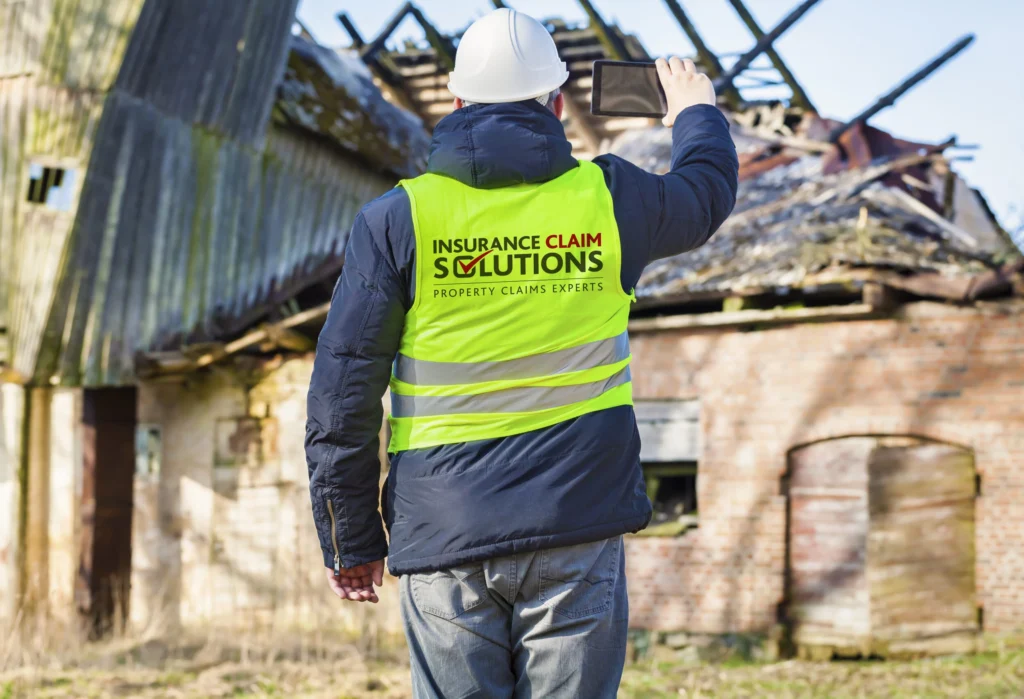
What is Business Interruption Insurance and How Does it Work in Ireland?
Simply put, business interruption insurance – also known as BI insurance – pays your business for financial losses when you cannot operate normally due to unexpected events. It is a safety net that helps when things outside your control reduce your income.
A common definition of business interruption insurance you might find online is: “If your premises are damaged by fire, flood, or other insured events that are covered by the insured perils on your policy, business interruption insurance compensates for loss of gross profit; less any savings; plus any increased cost of working, incurred during the indemnity period.”
This is accurate but technical. Let’s explain it in practical Irish terms. Imagine a popular pub in Galway. It must close because of a fire. Property insurance covers the building damage. But business interruption insurance does more. It covers the lost income from missed sales of drinks and food, and cancelled events. It can also cover extra costs to keep the business running. This might include renting temporary equipment or a temporary location to keep operating.
Importantly, business interruption insurance is not a separate policy. It works with your commercial property insurance. It starts working when an insured event, covered by your property policy, causes physical damage that stops your business. This link to physical damage is very important. It is called the Material Damage Proviso. We will explain this more later. Remember, the Material Damage Proviso is a key factor, but your entire policy wording, including all terms, conditions, and exclusions, determines your coverage. Always read your specific policy document carefully. If you want to understand more about different types of insurance policies, reading about selecting the correct insurance policy could be beneficial.

Flooding and Storms: Common Natural Disaster Causes of Business Interruption in Ireland
Knowing the possible causes of business interruption helps you see why this insurance is valuable. In Ireland, we have specific risks, some more common than others:
- Natural Disasters, Especially Flooding: Ireland is beautiful but also faces extreme weather. Storms and flooding are becoming more common. They can severely damage businesses. Think of a shop in Cork city centre flooded after a river overflowed. Or a hotel in Kerry damaged by a storm. Damage can be large, forcing businesses to close and stop trading. Flooding is a major natural disaster risk for Irish businesses. For advice on storm damage claims, see our article on how to claim for storm damage.
- Fire and Explosions: Fire is always a risk. It can happen in a Dublin factory or a family restaurant in Limerick. A fire, even a small one, can cause big damage. It can make buildings unusable and stop business for weeks or months. Explosions are less common but can be even worse. For more information on fire damage claims, read our guide to fire and smoke damage insurance claims.
- Supply Chain Issues: Businesses today rely on complex supply chains. Problems anywhere in this chain can spread quickly. Consider a local factory that needs parts from overseas. If a key supplier’s factory is damaged by a storm or fire, it can stop production in Ireland. This affects income even if the Irish business is not damaged.
- Cyber Attacks: The digital age brings new risks. Cyber attacks are increasing. They target businesses of all sizes. A ransomware attack that locks up computer systems can stop operations. This can prevent taking orders or processing payments. For many Irish businesses, especially those using online systems, cyber attacks are a real and growing threat to business. Some specialist cyber insurance policies offer non-damage business interruption coverage. This means you can claim for business interruption losses from a cyber attack even without physical damage to your hardware. However, this type of cover is less common than traditional business interruption insurance. Always check your specific cyber policy wording.
- Loss of Utilities: We expect utilities to work, but power cuts, water supply problems, or gas leaks can halt businesses. Imagine a data centre in Dublin losing power. Or a food factory in the country without water. These problems can last hours or days. This can cause significant losses. Utility failure coverage usually applies to failures at the source of supply. For example, a power cut due to a problem at a national grid substation, or a water outage due to a burst main pipe managed by the water authority. It typically does not cover utility failures within your direct control or on your property, such as a blown fuse in your building or a burst pipe on your premises (unless that burst pipe itself is the result of an insured peril).
- Damage to Nearby Buildings and Blocked Access: Sometimes, your business is not directly damaged. If a fire in a building next to yours makes your building unsafe or blocked off by police, you can still lose business income. This is especially true in busy city areas.
- Equipment Breakdown: For some businesses, specific equipment is essential. If important machines in a factory break down, or a server fails in an IT company, it can cause long delays and lost income.
Understanding these possible causes in Ireland shows how much protection business interruption insurance can offer.

Does Business Interruption Insurance Cover My Business? Understanding the Material Damage Proviso in Ireland.
The main question is whether your insurance policy covers business interruption. The good news is that most standard commercial property insurance policies in Ireland include business interruption cover. It may be standard or an optional extra. However, what is considered “standard” can vary between different insurance companies. Always review your own policy wording to confirm your specific coverage.
However, it is vital to understand the “Material Damage Proviso.” This means that for a business interruption claim to be valid, your insured property must have physical damage from an insured event.
Let’s explain this:
- Physical Damage: This means real, physical harm to your buildings, contents, or stock. This could be fire, flood, storm, or vandalism damage. It is not just a drop in sales because of the economy or changing customer habits. If your property has suffered damage, you might want to read about what to do when your property is damaged.
- Insured Peril: The physical damage must be from an event listed as an “insured peril” in your property insurance policy. Common insured perils are fire, storm, flood, malicious damage, impact, and burst pipes. It is very important to check your policy to see which perils are covered. Policy wordings differ, so what is covered for one business might not be for another. For more information on this, see our article on what is an insured peril.
- Link Between Damage and Interruption: The physical damage must directly cause the business interruption. The damage must be the direct reason you cannot trade or operate normally.
Example: A clothing shop in Galway is hit by a storm. The roof is damaged. Rain gets in and ruins stock. The shop is unsafe to open. This is physical damage from an insured peril (storm). The shop closure and lost sales would likely be covered by business interruption insurance. This is because the Material Damage Proviso is met. Remember, this is subject to all other terms, conditions and exclusions in your specific insurance policy. Always check your own policy document.
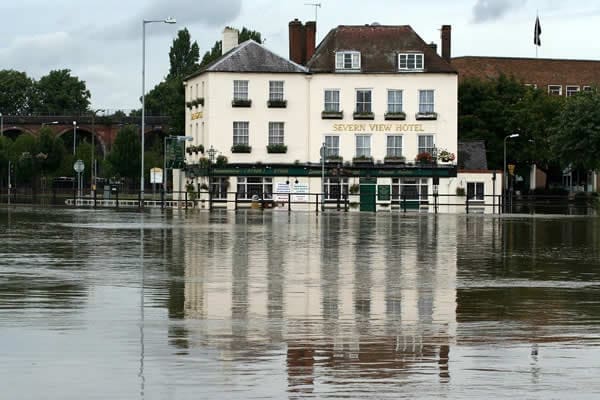
However, claims may be complex or denied in these situations due to the Material Damage Proviso:
- Pandemics and Government Closures: The COVID-19 pandemic showed a problem with many business interruption policies. “Standard” policies often exclude losses from disease outbreaks or government-ordered closures if there is no physical damage to the insured property. Some policies may cover denial of access due to government action. But this cover is often limited. It may not cover pandemic closures. Review your policy carefully after recent events. Discuss this with your broker. Policy wordings vary significantly between insurers.
- Cyber Attacks (without physical damage): A cyber attack can stop your IT systems and prevent trading. But if it does not cause physical damage to your computers, it might not trigger a standard business interruption claim. This is because of the Material Damage Proviso. However, special cyber insurance policies often include business interruption cover for cyber risks. This can apply even without physical damage. But again, policy wordings vary, so check your specific cyber insurance policy.
- Economic Downturn or Losing a Key Customer: A general economic downturn or the loss of a major client reduces business and profit. This is not covered by business interruption insurance. There is no physical damage from an insured peril.
Key Point: Always understand the Material Damage Proviso and the insured perils in your policy. If unsure, ask your insurance broker. For expert claim advice, contact Insurance Claim Solutions. We can check your policy and explain your business interruption cover. Do not assume that “standard” policies are all the same – always check your own policy wording. For more help understanding your policy, you can also read our guide to understanding your home insurance policy as many principles are similar for commercial policies.
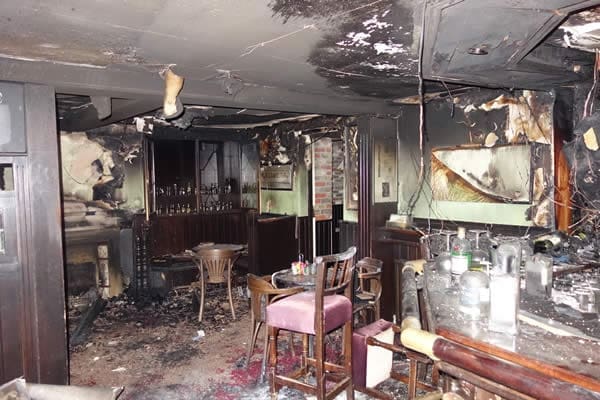
Key Types of Business Interruption Insurance Coverage for Irish Businesses.
Business interruption insurance policies can differ. They can offer various coverage types and extensions. Knowing these differences is important to ensure your policy fits your business needs:
- Loss of Gross Profit Coverage: This is the most common type of business interruption cover. It aims to pay you for the loss of gross profit you would have earned if the interruption had not happened. Gross profit is usually turnover minus the cost of goods sold. The policy usually considers savings during the interruption. For example, reduced utility bills or wages if staff are temporarily off work. It also considers any extra costs to reduce the loss. This is often the main part of the definition we discussed earlier. Your specific policy wording will detail exactly how gross profit is calculated for your claim.
- Increased Cost of Working (ICOW) Coverage: Besides lost profit, business interruption insurance can also cover reasonable extra expenses to reduce the interruption’s impact and restart trading quickly. Examples of ICOW include:
- Renting temporary buildings to continue working.
- Hiring temporary staff.
- Faster repairs to reopen sooner.
- Overtime pay to catch up on production.
- Advertising to tell customers you are open again.
- Loss of Rent Receivable Coverage (for Landlords): If you are a landlord and your rental property becomes unliveable due to an insured event, business interruption insurance can cover the lost rental income during the interruption. The specific terms and conditions for loss of rent receivable will be in your policy.
- Contingent Business Interruption Coverage: This extends cover beyond damage to your own buildings. Contingent BI covers losses from damage to the buildings of your important suppliers or customers. For example:
- Supplier Contingent BI: If a fire at your main supplier’s factory stops their production, and you cannot get materials elsewhere, your business may suffer. Contingent BI can cover your lost profits.
- Customer Contingent BI: If a major customer’s buildings are damaged, and they can no longer buy from you, you could lose income. Contingent BI can cover this. Contingent customer business interruption cover may also require that you have lost contact with your major customer due to the damage at their premises. The policy is not simply designed to cover losses if a major customer chooses to buy from someone else after they recover from damage.
- Denial of Access Extension: This extension covers you when your buildings are not damaged but you cannot access them because of an insured event nearby. For example, if a bomb scare on your street blocks access to your shop, this extension could start business interruption cover. This is even if your shop is not damaged. However, these extensions often have specific rules. Denial of access extensions can be very specific about the circumstances that trigger cover, so careful policy review is essential. Check your policy carefully.
- Utility Failure Extension: This extension covers business interruption losses from failures of essential utilities (electricity, gas, water, phones) at the source. This applies even if your buildings are undamaged. This is vital in areas that often have utility outages. The exact definition of “utility failure” and what is covered will be detailed in your policy extension. Always refer to your policy wording.
When checking your business interruption insurance, think about these different coverage types. Make sure your policy covers the specific risks your business faces. Insurance Claim Solutions can help you review this. We can ensure you have the right cover. Remember, this article provides general guidance. Your own specific policy wording is the definitive source of information about your coverage. If you are considering your overall insurance needs, you might find our article on avoiding costly underinsurance useful.
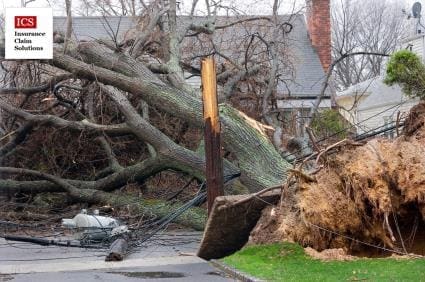
When Business Interruption Claims May Be Denied: How to Avoid Problems
Even with good business interruption cover, claims can be denied. Knowing why claims are denied helps you avoid mistakes and improve your claim chances:
- Not Meeting the Material Damage Proviso: As stated, no physical damage from an insured peril is the most common reason for denial. If your interruption is not from physical damage covered by your property policy, your BI claim will likely fail. Understanding insured perils and the Material Damage Proviso is vital. However, remember that even if the Material Damage Proviso is met, other policy terms and exclusions can still lead to claim denial.
- Policy Exclusions: All insurance policies have exclusions. These are events not covered. Common exclusions in business interruption policies can include:
- War, terrorism, and nuclear events.
- Pollution (unless from an insured peril).
- Wear and tear, gradual damage, or built-in faults.
- Losses not directly from the insured event.
- Sometimes, cyber events (unless covered by a cyber extension or separate cyber policy).
- Not Enough Documentation:Claims need strong proof. If you cannot properly document your losses, your claim may be reduced or denied. This includes:
- Financial Records: You must provide detailed financial records. This includes profit and loss statements, sales figures, and tax returns. These show your past profits and the financial impact of the interruption. Good financial records are essential for a business interruption claim. The specific financial documents required will be detailed by your insurer or loss adjuster.
- Proof of the Insured Event and Damage: You need proof of the event that caused the damage. This could be photos, incident reports, or news articles. The insurer will expect clear evidence linking the insured peril to the physical damage and the business interruption.
- Records of Extra Working Costs: Keep receipts for all extra costs to reduce losses. Ensure these records clearly justify the costs and how they helped mitigate your business interruption loss.
- Delayed Claim Notification: Insurance policies usually have time limits for reporting claims. Reporting your claim late can harm your claim and lead to denial. Act quickly and tell your insurer or broker as soon as possible. Check your policy wording for the exact notification timeframes. For tips on speeding up claims, you can read our article on how to speed up the insurance claim process.
- Underinsurance: If your business interruption sum insured is too low, you may not get full payment for your losses. Business interruption sums insured are usually based on your gross profit or revenue. They should cover the maximum possible loss during the indemnity period (usually 12, 24, or 36 months). Regularly check your sum insured to ensure it is enough, especially as your business grows. Underinsurance can significantly reduce your claim payout due to average clauses in policies. To understand more about this, see our article on underinsurance and how to avoid it.
- Failure to Reduce Losses: Insurance policies require you to take sensible steps to reduce your losses. If you do not try to minimise the impact of the interruption, the insurer may reduce your claim. Examples of steps you should take to reduce losses include:
- Moving undamaged stock to a safe location to prevent further damage or loss.
- Implementing temporary repairs to your premises to prevent further damage from weather or other elements.
- Actively contacting and seeking alternative suppliers if your usual supply chain is disrupted.
- Communicating with your customers to inform them of the situation and manage their expectations.
Avoiding these common mistakes needs good risk management, careful policy checks, and good record-keeping. Using Insurance Claim Solutions from the start of a claim can greatly reduce claim denial risks. It ensures your claim is presented effectively. Always remember to read your own specific policy wording as this article provides general guidance only.
Immediate Steps After a Business Interruption – Act Quickly for Your Irish Business
When business interruption happens, quick action is vital. Taking the correct steps quickly reduces losses and builds a strong base for your insurance claim:
- Safety First and Check the Situation: Your first concern is safety. Make sure everyone on your property is safe. Evacuate if needed. Once safe, check the extent of the damage and how it affects your business. Is it a full closure? Or can you operate partly? Find the most affected areas.
- Notify Your Insurer or Broker Right Away: Do not delay telling your insurance provider. Contact your insurer or broker immediately to report the incident and start the claim. Give them basic details of what happened, when, and the damage amount. Provide all information as accurately as possible and in line with your policy’s notification requirements. For general advice on dealing with insurers, see our guide on how to deal with an insurance adjuster.
- Document Everything – Evidence is Key for Claims: Good documentation is essential for a successful claim.
- Take Photos and Videos: Take detailed photos and videos of the damage to your buildings, contents, and stock. Include dates and descriptions. Ensure photos and videos are clear and accurately represent the damage.
- Keep Written Records: Write down events, dates, times, damage descriptions, actions taken, and conversations with insurers, suppliers, and customers. Keep a detailed log of all communications and actions related to the business interruption event.
- Keep Damaged Items (if safe): Do not throw away damaged items until your insurer or loss assessor says it is okay. They may need to inspect them. Store damaged items safely and securely to prevent further deterioration or loss of evidence.
- Take Steps to Reduce Further Losses: You must try to reduce losses. Take sensible and practical steps to prevent more damage or reduce the interruption’s impact. This might include:
- Securing damaged buildings to prevent theft or more damage.
- Covering damaged roofs or windows.
- Moving undamaged stock to a safe place.
- Finding temporary ways to keep working. Keep records of all steps you take to mitigate losses, as this will support your claim for increased costs of working.
- Communicate with Important People: Keep key people informed:
- Employees: Clearly tell staff about the situation, pay, and temporary work plans if possible.
- Customers and Suppliers: Tell customers about any service or order problems. Talk to suppliers about possible delays or alternatives. Maintain clear communication with customers and suppliers to manage expectations and minimise long-term damage to business relationships.
- Bank and Lenders (if needed): If the interruption is serious, tell your bank or lenders. They need to know about possible financial effects.
By acting quickly and correctly at first, you will protect your business and create a solid base for your business interruption claim. Insurance Claim Solutions can quickly come to your site to help with these initial steps. We can guide you through the entire claim process. You can learn more about our services on our claim services page. Remember, acting quickly and taking appropriate steps is crucial, but always prioritise safety above all else.
Key Documents for a Business Interruption Claim – Be Prepared in Ireland.
Preparing documents is a key step in making a business interruption claim. Having these documents ready will speed up the process and strengthen your claim: The specific documents required for your claim will be confirmed by your insurer or loss adjuster, but the following list is a good starting point.
- Your Insurance Policy Documents: Have copies of your policy schedule and policy wording ready. This confirms your cover details, insured perils, exclusions, and policy rules. Ensure you have the most up-to-date version of your policy documents.
- Financial Records – The Foundation of Your Claim: Detailed financial records are essential to show your losses. You will usually need to provide:
- Profit and Loss Statements and Balance Sheets: For the past 3-5 years if possible. This shows your business’s financial history. Provide your most recent financial statements and any available interim accounts.
- Monthly or Weekly Sales Figures: For at least 12 months before the interruption. This shows normal sales patterns. Gather sales data in a format that is easy to analyse and compare pre- and post-interruption.
- Annual Accounts and Tax Returns: To further prove your business’s finances. Provide copies of your filed tax returns for the relevant periods.
- Budgeted Financial Information (if available): To support your estimates of lost future profits. If you prepared business forecasts or budgets, include these to support your claim for projected losses.
- Proof of the Insured Event and Damage: Collect evidence to prove the cause and amount of damage:
- Photos and Videos of Damage.
- Incident Reports (e.g., Fire Brigade Report, Police Report, Engineer’s Report).
- Weather Reports (for storm or flood claims).
- News Articles (if relevant). Collect any official reports or documentation that confirms the insured event and the resulting damage.
- Expense Records for Increased Working Costs: Keep good records and receipts for all extra costs to reduce losses. Examples include:
- Invoices for temporary building rental.
- Invoices for temporary equipment.
- Payroll records for overtime or temporary staff.
- Receipts for advertising costs. Ensure all expense records are clearly itemised and directly related to mitigating the business interruption loss.
- Business Continuity Plan (if you have one): Your business continuity plan can show your preparation and efforts to reduce losses. Providing your business continuity plan can demonstrate proactive risk management and may strengthen your claim.
Organising these documents early, or knowing what you will need, will greatly speed up claims. Insurance Claim Solutions can advise you on the specific documents needed for your claim. We can help prepare a strong claim. The more organised and comprehensive your documentation, the smoother and more successful your claim process is likely to be.
How to Make a Business Interruption Insurance Claim – Claim Process in Ireland
Making a business interruption claim can be difficult. Especially when you are already dealing with business disruption. Understanding the claim process and having expert help is very valuable. Here is a step-by-step overview of a typical business interruption claim process in Ireland: Remember, every claim is unique, and the exact process may vary depending on your insurer and the specifics of your situation.
- Initial Notification to Insurer: First, quickly tell your insurer or broker about the interruption. Give them basic details and your policy number. Notify them in writing and keep a copy of your notification for your records.
- Loss Adjuster Appointment: The insurance company will appoint a Loss Adjuster. Remember, the Loss Adjuster works for the insurer. Their job is to investigate the claim, check the damage and losses, and report to the insurer. They are professionals, but they represent the insurer’s interests. If you want to know more about loss adjusters and their role, see our article on what is a loss adjuster and what does a loss adjuster do. Be aware of the Loss Adjuster’s role and remember they are representing the insurance company, not you.
- Engaging Your Own Loss Assessor – Insurance Claim Solutions: This is where Insurance Claim Solutions helps you. As Ireland’s leading Loss Assessors, we work for you, the business owner. A Loss Assessor works only for you. We make things fairer by providing expert advice and help during the claim. We will:
- Carefully check your policy to fully understand your cover and what you are entitled to. We will explain your policy in clear terms and identify all potential areas of coverage.
- Prepare and present your claim clearly and persuasively. We aim to maximise your chances of a full and fair settlement. We will handle all claim documentation and communication with the insurer and Loss Adjuster.
- Negotiate with the Loss Adjuster and insurer for you. We protect your interests and challenge any unfair assessments. We have extensive experience in negotiating business interruption claims and will advocate strongly for your best outcome.
- Collect and present all needed documents to support your claim. We will guide you on the specific documentation required and assist in gathering and organising it.
- Accurately calculate your business interruption losses. This includes lost profits, extra working costs, and other losses. We use proven methodologies to calculate your losses and ensure all aspects of your claim are properly valued.
- Attend meetings with the Loss Adjuster. We ensure your voice is heard and your claim is properly considered. To understand more about why you might need a loss assessor, you can read our article do I need a loss assessor. Having a Loss Assessor on your side levels the playing field and ensures your claim is handled fairly.
- Loss Assessment and Investigation: The Loss Adjuster will investigate the claim. This may include:
- Visiting your site to check the damage.
- Reviewing your documents and financial records.
- Talking to you and your staff.
- Getting expert opinions (e.g., from accountants). Cooperate fully with the Loss Adjuster’s investigation, but ensure you are also represented by Insurance Claim Solutions to protect your interests throughout this process.
- Settlement Negotiation and Agreement: Based on the Loss Adjuster’s report, the insurer will offer a settlement. Negotiation is often needed here. The first offer may not fully cover your losses. Insurance Claim Solutions will expertly negotiate for you. We aim to get a fair and full settlement. This settlement should accurately reflect your policy and the real amount of your business interruption losses. Be prepared for a negotiation process and do not feel pressured to accept the first offer without expert advice.
- Compensation Payment: Once a settlement is agreed, the insurer will pay. Insurance Claim Solutions will ensure payment is made quickly and as agreed. We will review the settlement terms to ensure they are accurate and that payment is processed correctly and efficiently.
Key Point: You can manage a business interruption claim yourself. But using a professional Loss Assessor like Insurance Claim Solutions greatly increases your chances of a successful and larger claim payment. We have the knowledge, experience, and negotiation skills to handle complex claims. We ensure you get the full payment you deserve under your policy. If you are wondering about the cost of a loss assessor, our article on how much does a loss assessor cost provides useful information. Investing in professional representation can often result in a significantly better claim outcome, outweighing the cost of a Loss Assessor.

Common Mistakes in Business Interruption Claims: Learn to Avoid Them.
Learning from others’ mistakes can save you trouble and money in a business interruption claim. Here are common errors to avoid: Avoiding these mistakes can significantly improve your claim outcome.
- Delaying Claim Notification: As mentioned many times, report claims promptly. Do not delay telling your insurer. Delays can reduce or deny your claim. Check your policy for specific time limits for claim notification and adhere to these strictly.
- Underestimating Claim Complexity: BI claims are not simple. They need specialist knowledge of policies, loss assessment, and negotiation. Do not underestimate the difficulty. Get expert help. Business interruption claims often involve complex financial assessments and policy interpretations.
- Not Getting Professional Help Early Enough: Many businesses try to manage the claim themselves first. They only seek help when problems occur. Using Insurance Claim Solutions from the start is best. Early help allows us to guide the process and prevent problems. Engaging a Loss Assessor from the outset ensures your claim is handled correctly from the beginning and can prevent costly errors.
- Poor Documentation: Weak documentation weakens your claim. Make sure you collect and keep all needed financial records, damage evidence, and extra cost records. Inadequate documentation is a primary reason for claim delays and disputes. Be meticulous in gathering and organising all necessary documents.
- Accepting the First Offer: Initial settlement offers may have room for negotiation if additional evidence supports a higher valuation. Loss Adjusters are skilled negotiators working for the insurer. Do not accept the first offer without expert review and negotiation. Always have your settlement offer reviewed by Insurance Claim Solutions before accepting it.
- Not Understanding Your Policy: Insurance policies are legal documents with complex wording. Not fully understanding your policy can cause you to miss out on cover or misunderstand what is covered. Expert policy review is essential. Your policy wording is the contract between you and the insurer. Understanding it fully is crucial for a successful claim. If you have had a claim denied, you may find our article on 7 main reasons insurance claims are denied helpful. Prevention is always better than cure – understanding your policy before a loss occurs is highly recommended.
By knowing these common errors and avoiding them, you improve your chances of a successful and maximised business interruption claim. Remember, proactive steps and professional guidance are key to navigating business interruption claims effectively.

How to Prevent Business Interruption in the Future – Proactive Steps for Irish Businesses
While insurance is vital for financial protection, prevention is always better. Taking proactive steps to reduce business interruption risk is a smart business strategy: Investing in prevention measures can save you significant time, money, and stress in the long run.
- Regular Risk Assessments: Identify possible risks that could stop your business. This includes natural disasters, fire risks, cyber risks, supply chain problems, equipment failures, and utility issues. Regularly review your risk assessments. Update them as your business changes and the world changes. Risk assessments should be a dynamic process, reviewed and updated at least annually or whenever there are significant changes to your business operations or external environment.
- Implement Preventive Measures: After identifying risks, take action to reduce their chance or impact. This could include:
- Fire safety systems: Alarms, sprinklers, extinguishers, fire drills. For tips on fire prevention, see our article on fire safety tips for your home or business. Regularly inspect and maintain all fire safety equipment.
- Flood defences: Barriers, raised floors, moving equipment from flood risk areas. For tips on flood prevention and claims, see our guide to flood damage claim tips. Consider long-term flood mitigation measures if your business is in a flood-prone area.
- Cybersecurity: Firewalls, antivirus, data backups, employee training. Invest in robust cybersecurity measures and regularly update your systems to protect against evolving cyber threats.
- Equipment maintenance: Regular checks for important machines. Implement a preventative maintenance schedule for all critical equipment to minimise breakdowns.
- Multiple suppliers: Reduce reliance on single suppliers. Diversifying your supply chain reduces your vulnerability to disruptions affecting a single supplier.
- Backup power: Generators to ensure power during outages. Consider investing in backup power solutions, especially if power outages are a frequent risk in your area.
- Develop a Business Continuity Plan (BCP): A BCP explains how your business will continue during and after a disruption. It should include:
- Emergency procedures: For different incidents.
- Data backup and recovery plans.
- Alternative work locations or remote work plans.
- Communication plans: For staff, customers, and suppliers.
- Supplier backup plans.
- Regularly test and update your BCP. Your BCP should be a living document, regularly tested and updated to ensure its effectiveness and relevance. Conduct drills and simulations to test your BCP and identify areas for improvement.
- Regular Insurance Policy Review: Do not ignore your insurance policy after you buy it. Review your business interruption and property insurance policies every year with your broker. Ensure your cover is still good, your sums insured are correct, and your policy reflects any business changes or new risks. For more on policy reviews, see our article on understanding your home insurance policy, as policy review principles are similar for business insurance. Schedule annual insurance policy reviews with your broker to ensure your coverage remains adequate and aligned with your evolving business needs.
Investing in prevention and planning is not just about avoiding business interruption. It is about making your business stronger and more sustainable long-term. Proactive risk management and business continuity planning are essential components of a resilient and successful business.
Frequently Asked Business Interruption Claim Questions for Irish Businesses
Here are common questions we get at Insurance Claim Solutions about business interruption insurance: These FAQs provide general information. Always consult your specific policy wording and seek professional advice for your individual circumstances.
What does business interruption insurance actually cover?
Business interruption insurance covers your business’s financial losses when you cannot operate normally due to physical damage from an insured event. This includes lost gross profit, extra working costs, and possibly other losses, depending on your policy. It aims to put your business finances back to where they would have been if the interruption had not occurred. The specific details of what is covered and how losses are calculated will be defined in your individual policy wording.
Are natural disasters like storms and floods covered by business interruption insurance in Ireland?
Yes, storms and floods are usually covered insured perils in business interruption policies in Ireland. This is as long as physical damage is the reason for the interruption. However, always check your policy to confirm covered perils, exclusions, and limits. Coverage for natural disasters can vary depending on the specific policy and insurer. Always confirm your coverage details with your broker or insurer.
How long does business interruption insurance typically last?
Business interruption policies cover losses for a set indemnity period. This is the maximum time the insurer will pay for losses. Standard indemnity periods are usually 12, 24, or 36 months. The indemnity period should be long enough for your business to fully recover and return to its pre-loss trading position. The best indemnity period depends on your business and how long it might take to rebuild, repair, and restart operations. Consider the complexity of your business and potential recovery time when selecting your indemnity period. Longer indemnity periods provide greater protection but may also increase premiums.
Can small businesses afford business interruption insurance cover?
Yes, business interruption insurance is vital for all businesses, including small ones. The cost varies, but policies are available for different budgets. Think about the cost of not having business interruption cover. The financial impact of a major disruption could be very bad for a small business. The premium is a small cost for security and peace of mind. For advice on managing insurance costs generally, you may find our article on small insurance claims relevant. Business interruption insurance is often more affordable than businesses may think, and the potential benefits far outweigh the cost.
What if my business interruption claim is denied by the insurer? A. If your claim is denied, do not just accept it. Get expert advice from Insurance Claim Solutions.
If your claim is denied, do not just accept it. Get expert advice from Insurance Claim Solutions. We can review the denial reasons, check if the insurer is correct, find grounds to appeal, and negotiate with the insurer to challenge the denial. You have the right to appeal a claim decision. For more information on claim denials, see our article on why are insurance claims denied. Claim denials are not always final. Seeking professional advice can help you understand your rights and explore options for challenging a denial.
Do I need separate insurance for cyber-related business interruptions for my Irish business?
Standard business interruption policies may not fully cover cyber-related interruptions. The Material Damage Proviso can be a problem here. Consider getting a specific cyber insurance policy. Cyber policies often include business interruption cover designed for cyber risks. This can cover losses from ransomware, data breaches, system failures, and other cyber events, even without physical damage. If your business relies heavily on IT systems, dedicated cyber insurance with business interruption cover is highly recommended.

Insurance Claim Solutions – Your Expert Partner for Business Interruption Claims in Ireland
Business interruption insurance is a key safety net for Irish businesses. It provides vital financial protection when unexpected events happen. However, understanding policy details, claim processes, and negotiations can be hard. Especially when your business is already disrupted. Navigating business interruption claims can be complex and time-consuming. Insurance Claim Solutions is here to simplify the process and advocate for your best interests.
That is where Insurance Claim Solutions helps. As Ireland’s leading Loss Assessors, we work only for you, the business owner. Led by my 20+ years of experience as a Chartered Surveyor, we have a strong record of managing thousands of business interruption claims for Irish businesses of all sizes. Our expertise and experience ensure you have the best possible representation throughout your business interruption claim.
Do not handle your business interruption claim alone. Contact Insurance Claim Solutions today for expert, unbiased advice and professional help. We will ensure your claim is handled efficiently and effectively. We aim to get you the full compensation you deserve. This will allow you to get back to business with confidence. You can contact us for insurance claim help or directly via our contact page. For testimonials from satisfied clients, please see our reviews page. Let Insurance Claim Solutions be your trusted partner in navigating your business interruption claim and securing a fair and maximised settlement.
Trevor Kelly, Managing Director, Insurance Claim Solutions & Rebuildvaluation.ie – Your Advocate in Irish Insurance Claims.
Disclaimer: This article provides general information on business interruption insurance and claims in Ireland for information only. It is not legal, financial, or insurance advice. For advice specific to your situation, please consult with a qualified insurance professional or Loss Assessor at Insurance Claim Solutions. Policy wordings and coverage vary. It is important to carefully review your own policy documents. This article is for general guidance only and should not be considered a substitute for professional advice tailored to your specific business and insurance policy.

